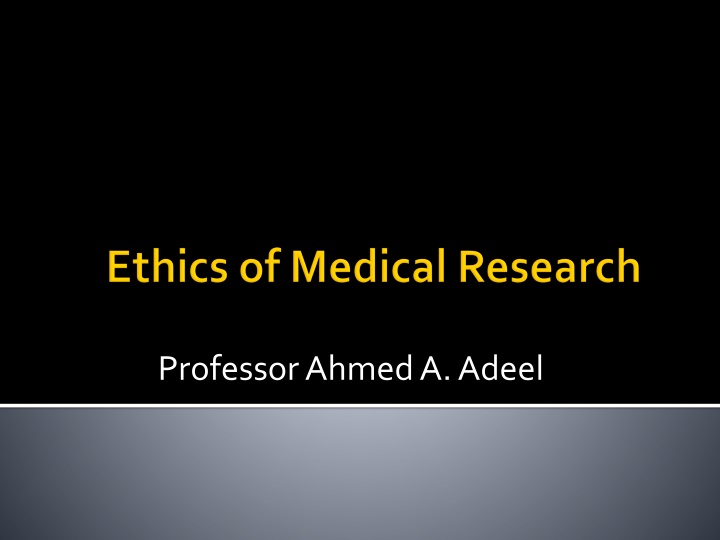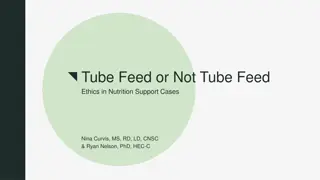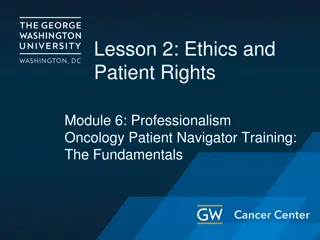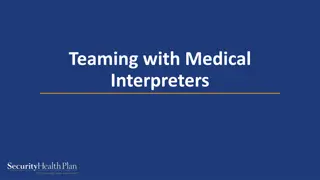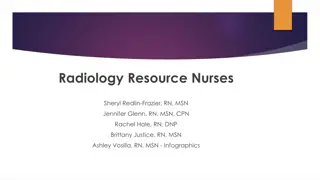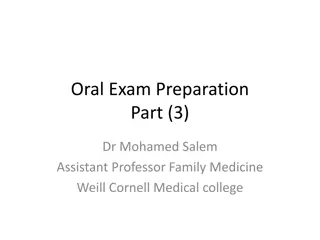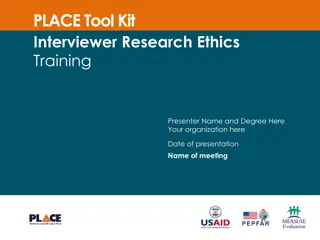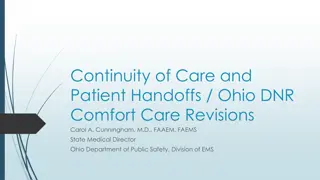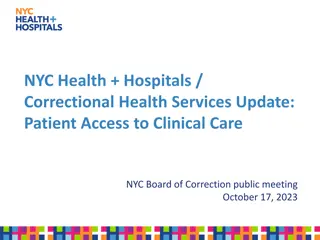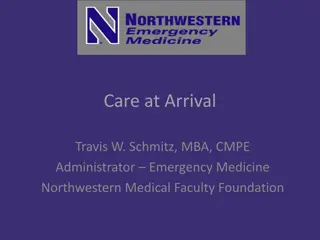Ethics in Medical Research: Balancing Patient Care and Knowledge Generation
This content explores the main principles of medical research ethics, the relationship between research and clinical care, and the importance of ethics review committees. It discusses the responsibilities of physicians and researchers, the necessity of staying updated with research, and the consequences of conflicts of interest. Additionally, it delves into historical violations of human rights in medical research, such as those in Nazi Germany during World War II and the resulting Nuremberg Code.
Download Presentation

Please find below an Image/Link to download the presentation.
The content on the website is provided AS IS for your information and personal use only. It may not be sold, licensed, or shared on other websites without obtaining consent from the author.If you encounter any issues during the download, it is possible that the publisher has removed the file from their server.
You are allowed to download the files provided on this website for personal or commercial use, subject to the condition that they are used lawfully. All files are the property of their respective owners.
The content on the website is provided AS IS for your information and personal use only. It may not be sold, licensed, or shared on other websites without obtaining consent from the author.
E N D
Presentation Transcript
By the end of this lecture the student should be able to Identify the main principles of medical research ethics. Discuss the balance of research and clinical care. Describe requirements of ethics review committees, including definition of informed consent. Identify the key international and national references for the rules and regulations of medical research 1) 2) 3) 4)
Monitoring and evaluation of drugs / treatments being used The development of new treatments, especially drugs, medical devices and surgical interventions. Understanding human physiology . Understanding causes of diseases and the best ways to prevent or cure them. Factors in human health, including patterns of disease (epidemiology), The organization, funding and delivery of healthcare (health systems research), Social and cultural aspects of health (medical sociology and anthropology),
All physicians make use of the results of medical research in their clinical practice. To maintain their competence, physicians must keep up with the current research , they must know how to interpret the results of research and apply them to their patients.
1. The physicians primary responsibility is the health and well-being of the patient, whereas the researcher s primary responsibility is the generation of knowledge, which may or may not contribute to the research subject s health and wellbeing . 2. Conflict of interest when the physician is influenced by financial gains from research or results of the research.
In During World War II , physicians in Nazi Germany and elsewhere performed research on subjects that clearly violated fundamental human rights. The Nazis immersed their subjects into vats of ice water at sub-zero temperatures, or left them out to freeze in the winter cold. As the prisoners excreted mucus, fainted and slipped into unconsciousness, the Nazis meticulously recorded the changes in their body temperature, heart rate ,muscle response, and urine.
Following World War Two, some of these physicians were tried and convicted by a special tribunal at Nuremberg, Germany. The basis of the judgment is known as the Nuremberg Code, which has served as one of the foundational documents of modern research ethics. 23 German doctors were charged with crimes against humanity for experiments the defendants committed the murders, brutalities, cruelties, tortures, atrocities, and other inhuman
the Tuskegee Study of Untreated Syphilis in the Negro Male This clinical study that has become a symbol of unethical medical experimentation.
Started in 1932 and involved nearly 400 poor and uneducated African-American men diagnosed with latent syphilis - meaning that they had the infection but showed no obvious symptoms at that stage.
For 40 years they were never told they had syphilis and were never treated for it, even when penicillin became a standard cure in 1947. They were simply told they had bad blood . Among the aims of the study was to see whether syphilis affected black men differently from white men.
For participating in the study, the men received free rides to and from the clinic at Tuskegee University, Alabama. There they were given hot meals and free medical treatment for minor ailments. Any treatments they thought they were also getting for their bad blood were actually placebos, aspirin or mineral supplements. Medical staff allowed nothing to interfere with their work. Even when 250 of the men were drafted for service in the Second World War, they remained part of the study.
When the study ended in 1972 following a public outcry, only 74 of the original participants were still alive.
Only 74 men were still alive. All rest had died of the disease or of related complications. 40 wives had been infected 19 children had been born with congenital syphilis. Survivors eventually received financial compensation
1997 US President Bill Clinton was moved to declare that on behalf of the American people, what the United States government did was shameful
Principles of Research with Human Subjects: Respect for Persons Beneficence Justice .1 .2 .3 http://ohrp.osophs.dhhs.gov/humansubjects/guidance/belmont.htm
Principles of Research with Human Subjects Respect for Persons individuals have autonomy and choice people can not be used as a means to an end provide protection to the vulnerable provide informed consent and privacy Beneficence Justice
Principles of Research with Human Subjects Respect for Persons Beneficence kindness beyond duty obligation to do no harm obligation to prevent harm obligation to do good minimize risks, maximize benefits Justice
Principles of Research with Human Subjects Respect for Persons Beneficence Justice treat all fairly share equitably burdens and benefits
Issued by World Medical Association (WMA) in 1964. It was further revised in 1975, 1983, 1989, 1996, 2000 and 2008. The DoH is a concise summary of research ethics. Other, much more detailed, documents have been produced in recent years on research ethics in general (e.g., Council for International Organizations of Medical Sciences, International Ethical Guidelines for Biomedical Research Involving Human Subjects, 1993, revised in 2002) and on specific topics in research ethics (e.g., Nuffield Council on Bioethics [UK], The Ethics of Research Related to Healthcare in Developing Countries, 2002).
(1) Ethics Review Committee Approval Medical research on human subjects must be reviewed and approved by an independent ethics committee before it can proceed. (2) Scientific Merit Medical research involving human subjects must be justifiable on scientific grounds . ( 3) Qualified Researchers : Medical research involving human subjects must be conducted by qualified researchers. (4) Social Value Medical research project should that it contribute to the wellbeing of society in general. (5) Risks and Benefits It is also necessary for the researcher to demonstrate that the risks to the research subjects are not unreasonable or disproportionate to the expected benefits of the research, which may not even go to the research subjects. (6) Informed Consent The first principle of the Nuremberg Code reads as follows: The voluntary consent of the human subject is absolutely essential.
(7) Confidentiality Research subjects have a right to privacy with regard to their personal health information. (8) Conflict of Roles The physician s role in the physician-patient relationship is over the researcher s role ,even if the physician and the researcher are the same person. (9) Honest Reporting of Results Research results be reported accurately, but unfortunately there have been numerous recent accounts of dishonest practices in the publication of research results. (10) Whistle-blowing In order to prevent unethical research from occurring, or to expose it after the fact, anyone who has knowledge of such behaviour has an obligation to disclose this information to the appropriate authorities.
(11) Justice Equitable selection of participants, i.e., avoiding participant populations that may be unfairly coerced into participating, such as prisoners and institutionalized children. The principle of justice also requires equality in distribution of benefits and burdens among the population group(s) likely to benefit from the research.
Definitions: Voluntary agreement given by a person or a patients' responsible proxy (e.g.a parent) for participation in a study, etc., after being informed of the purpose, methods, procedures, benefits, and risks. The essential criteria of informed consent are that the subject has both knowledge and comprehension, that consent is freely given without duress or undue influence, and that the right of withdrawal at any time is clearly communicated to the patient. Other aspects of informed consent in the context of epidemiologic and biomedical research, and criteria to be met in obtaining it, are specified in International Guidelines for Ethical Review of Epidemiologic Studies (Geneva: CIOMS/WHO 1991) and International Ethical Guidelines for Biomedical Research Involving Human Subjects (Geneva: CIOMS/WHO 1993).
Scientific design and conduct of the study Risks and potential benefits Selection of study population and recruitment of research participants Inducements, financial benefits, and financial costs Protection of research participants privacy and confidentiality Informed consent process Community considerations
The National Committee of Medical & Bioethics was approved by the Royal Decree on 18/5/1422H, to be headquartered at KACST in Riyadh. It consists of the following sub-committees: 1. The legal sub-committee. 2. The human research sub-committee. 3. The flora & animal sub-committee. 4. The education & media sub-committee.
Mrs X , an 81-year-old Alzheimer's patient hospitalized under your care has been asked to participate in a clinical trial testing a new drug designed to help improve memory. You were present when the clinical investigator obtained a signed informed consent from Mrs X a few days ago. However, when you visit Mrs. X today and ask her if she is ready to begin the study tomorrow, she looks at you blankly and seems to have no idea what you are talking about. What should you do?
The competence of Mrs. X to give an ethically valid informed consent is in doubt. You should contact the primary investigator to discuss Mrs. X s participation in the trial. There may be a surrogate who can give consent for her participation if it is deemed to be in her best interests. Although she may be considered a vulnerable research subject because of her mental status, Mrs. X does belong to the population the intervention is designed to assist, and her participation may benefit herself and other Alzheimer's patients. However, a careful balancing of risks and benefits should occur.
After having completed a study that involved the collection of tissue from the subjects, an investigator wishes to perform additional analysis of the archived tissue samples. This nature of this analysis was not explicitly ( ) stated in the original consent form. Should the investigator be required to obtain explicit consent for the new research?
Institutional Review Boards (or research committees) have increasingly required that explicit consent be obtained, if practical, before archived tissue can used for research. Archiving samples for an unspecified future use without explicit consent undermines the autonomy of the participants. Even if participants may be willing in general to have surplus tissue used for research purposes, they should still be asked for their consent.
University of British Columbia (UBC) medical genetics researcher Dr. Richard Ward 883 subjects provided blood samples for arthritis study on a Canadian ethic group No conclusive results were obtained but the blood samples were used for other studies by the reseacher. Samples were used without consent for genetic analysis Results of genetic analysis suggested that the origin of the group was contrary to the group s own understanding What are the ethical issues in this case ?
Goal of study to understand risk factors connected with heterosexual HIV transmission Identified 415 couples in which one partner was HIV+ and other not Followed up for 30 months 90 of HIV- partners seroconverted No treatment offered for HIV+ participants It was left up to HIV+ partner to determine whether their status was disclosed to their partner What ethical issues do you see in this case?
Diagnostic test for of Henrietta Lacks reveals cervical cancer (1951) Cancer cells are removed for research purposes without consent Dr George Gey created the first immortal cell line Hela Cells , and they were widely shared Creation of the cell line generated an increase in medical and biological research, including a vaccine for polio, cancer research, AIDS research, among others The identity of Henrietta Lacks remained confidential until the 1970ies After her identity was known, the family found out for the first time that Henrietta Lack s cells were still alive.
The gist of the book, as I read it, is this: You have no legal property rights over your own cell tissue or anything it is used for after you visit a doctor's office. It is argued that this is necessary for the "good of mankind" - this generates research, vaccines, cures for diseases. However, after this free contribution is made, you do not have universal access to the scientific discoveries your tissues have afforded - you only have access to these discoveries if you can pay for them
Guidelines WHO Guidelines Standards and operational guidance for ethics review of health-related research with human participants Others: Council for International Organizations of Medical Sciences International ethical guidelines for biomedical research involving human subjects Council for International Organizations of Medical Sciences International ethical guidelines for epidemiological studies World Medical Association World Medical Association: Declaration of Helsinki
Group B 1. ABDULLAH ALSAHL 2. ABULAZIZ ALTUWAIL 3. FARIS BAKHISH 4. SUHAIL ALGHAMDI 5. ANAS ALZAHRANI 6. KHALID ANAZI Group A 1. Omer REHBANI 2. HISHAM ALMOHEEZ 3. MOHAMED ALTOWAITA 4. ABDULRAHMAN ASKER
